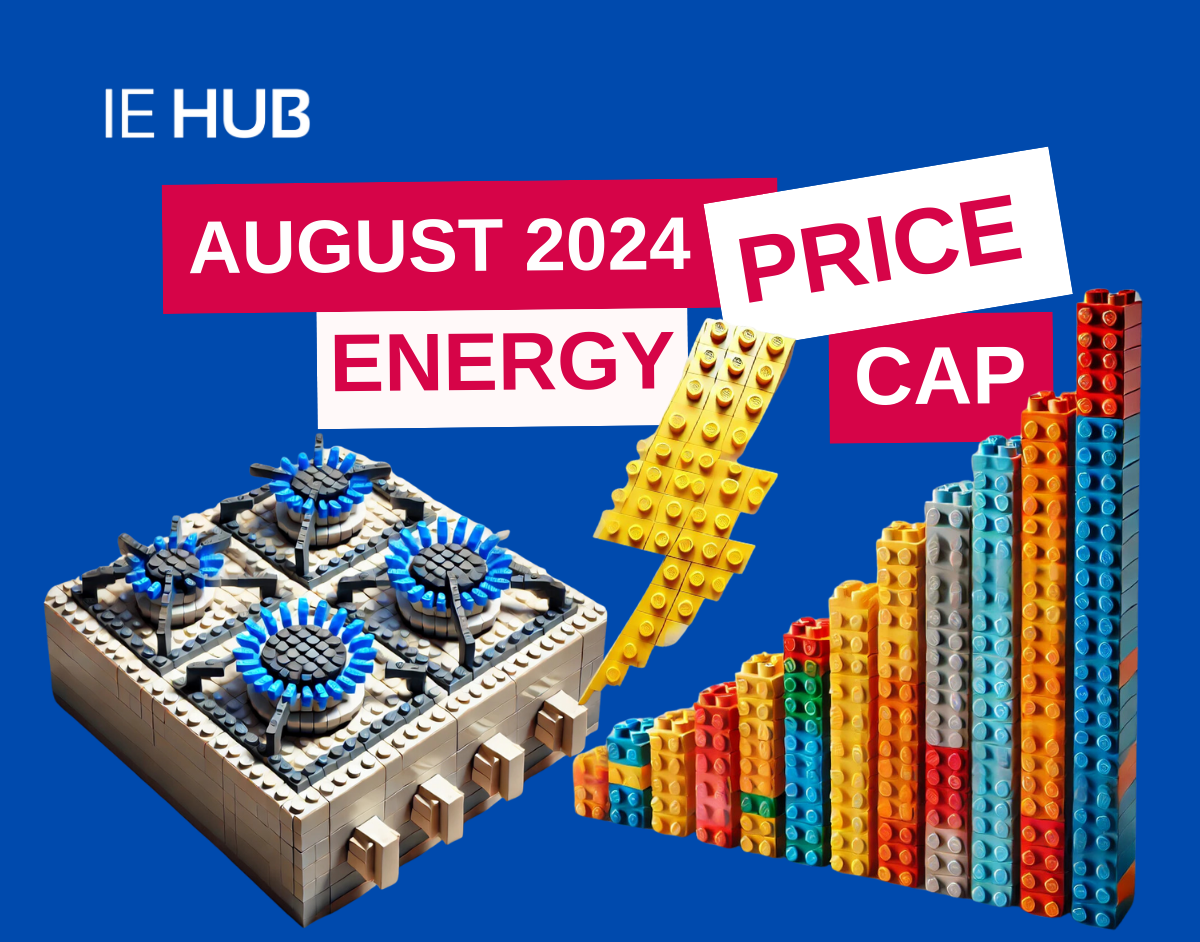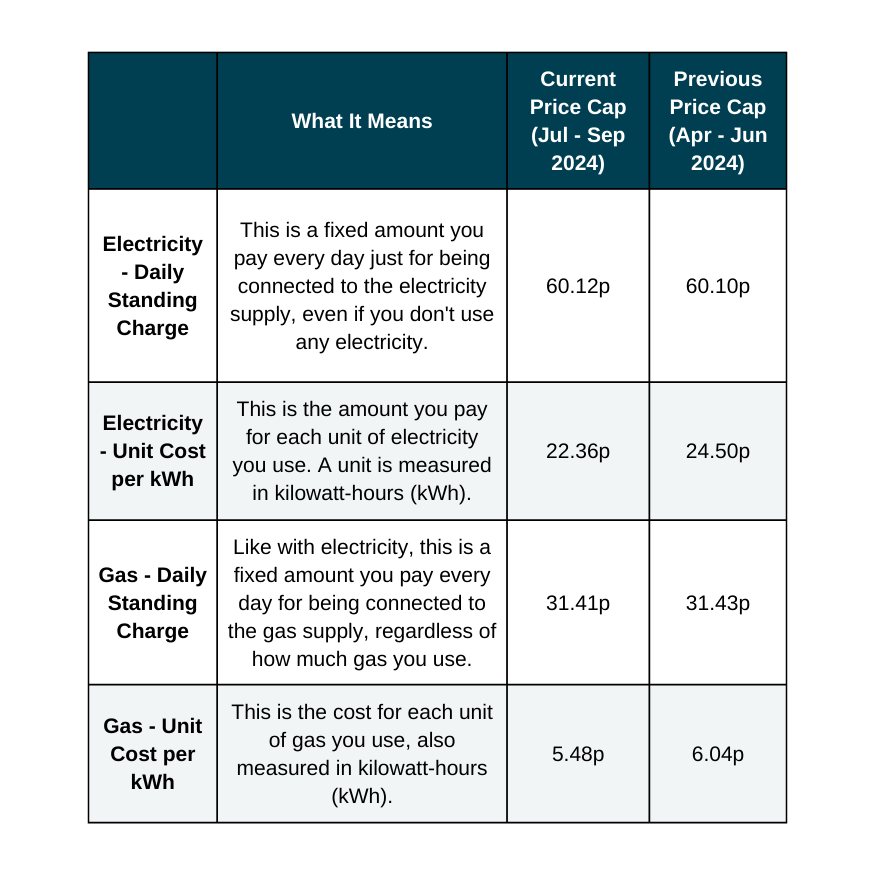
12 Aug
Understanding the August 2024 Energy Price Cap
Between July 1 and September 30, 2024, annual energy bills for a typical dual-fuel direct debit household in Great Britain are around £1,568. This is about £122 a year less than the previous price cap.
On August 27th, Ofgem is expected to announce a new energy price cap. It looks like your average annual bill could jump to £1,723 – that’s a 10% increase from now.
Here’s a breakdown of what the energy price cap means and how it affects you.
What is the Energy Price Cap?
The energy price cap limits the maximum amount energy suppliers can charge you for each unit of gas or electricity you use.
Ofgem, the UK’s energy regulator, introduced the price cap in 2019 to protect customers from overpaying, especially those who weren’t switching suppliers often.
How Does the Energy Price Cap Work?
The cap limits charges for:
⚡ Standing Charge: A daily fixed amount you pay regardless of usage.
⚡ Unit Price: The cost per kilowatt-hour (kWh) for gas and electricity.
Your actual bill depends on how much energy you use. Ofgem uses 12,000 kWh for gas and 2,900 kWh for electricity as a guide for an average household.

Why Are Electricity Rates Higher Than Gas?
While the UK uses more renewable sources like solar and wind for electricity, it still relies on gas when renewables can’t meet the demand, especially in the evening.
This makes electricity more expensive because gas prices influence the overall cost.
Who Does the Energy Price Cap Apply To?
The cap applies if you’re on a default tariff, including standard variable tariffs, regardless of payment method or meter type.
It doesn’t apply if:
⚡ You’re on a fixed-term tariff with agreed unit prices.
⚡ You’re on certain tariffs like some green or time-of-use tariffs.
If unsure, check your bill or contact your supplier.
When Does the Energy Price Cap Change?
Ofgem reviews the cap every three months. The next change will be announced on August 27, 2024, and will be effective from October 1 to December 31, 2024.
The expected increase will bring the average annual bill to £1,723, a 10% rise from the current cap of £1,568. This rise is due to higher wholesale market prices affected by global issues and supply-demand pressures. The new cap will be in effect from October 1 to December 31, 2024, and similar levels are expected for early 2025.
Can I Get Help to Pay My Energy Bills?
If you’re struggling with energy bills, there are ways to save.
Using IE Hub to Contact Your Energy Company
IE Hub is a free platform designed to simplify tracking your income and expenses. It helps you understand your financial situation better and simplifies how you can manage your bills and debts.
How Can IE Hub Help You?
⚡ Track Your Budget: Create an IE Hub account to keep track of your income, essential expenses, and what’s left. This will allow you to see if you can afford the upcoming increase in energy bills.
⚡ Update and Share Your Budget: Keep your budget up-to-date and share it with any companies you owe money to or want to negotiate lower bills with. This can be particularly helpful with energy companies, especially with the upcoming price cap changes.
⚡ Find Extra Support: Use IE Hub to discover any extra income/benefit opportunities and check if you qualify for special service provider tariffs, like the Priority Services Register (PSR).
Tips to Lower Your Energy Bills and Make Your Home More Energy-Efficient
Quick and Easy Tips to Save Energy
🔌 Turn Off Standby Mode: Unplug devices or use smart plugs to turn off appliances completely instead of leaving them on standby.
💡 Use Energy-Efficient Bulbs: Replace incandescent bulbs with LED or CFL bulbs, which use less energy and last longer.
🔥 Thermostat Management: Lower your thermostat by just 1°C to reduce heating bills by up to 10%.
⚡ Use a Programmable Thermostat: In the colder months, set your heating to turn off when you’re not home and to come on just before you return.
👚 Wash Clothes at Lower Temperatures: Washing at 30°C instead of higher temperatures can save a significant amount of energy.
👗 Air Dry Clothes: Whenever possible, hang your clothes to dry instead of using a tumble dryer.
🫖 Boil Only What You Need: When using a kettle, only boil the amount of water you need.
Long-Term Investments for Energy Efficiency
🏠 Insulate Your Home: Proper insulation in your loft, walls, and floors can significantly reduce heating costs by keeping warmth inside.
⚡ Upgrade Your Boiler: An efficient boiler can save hundreds of pounds a year. Consider a modern condensing boiler.
🪟 Install Double Glazing: Double-glazed windows help keep heat in and reduce energy bills.
☀️ Solar Panels: Installing solar panels can reduce your electricity bills and you might even be able to sell back excess energy to the grid.
⚡ Smart Meter: Use a smart meter to monitor your energy usage in real time and identify areas where you can cut back.
👩🏻🍳 Energy-Efficient Appliances: When replacing appliances, look for those with high energy-efficiency ratings.
🚪 Draught Proofing: Seal gaps around doors, windows, and floors to prevent heat from escaping and cold air from entering.
Everyday Habits to Reduce Energy Use
🚿 Shorten Showers: Reducing shower time can save both water and the energy used to heat it.
🍳 Cook Efficiently: Use lids on pans, and consider using a microwave or slow cooker, which are often more energy-efficient than ovens.
🌞 Maximise Natural Light: Open curtains during the day to use natural light instead of electric lighting.
🛠️ Regular Maintenance: Keep appliances and systems in good working order with regular maintenance to ensure they run efficiently.
By following these tips, you can make your home more energy-efficient and lower your energy bills, contributing to a greener environment and saving money in the long run.
Conclusion
With energy prices set to rise, it’s crucial to stay informed and proactive about your energy use and expenses.
Remember, every little bit helps when it comes to saving energy and money. Whether it’s turning off appliances on standby, using energy-efficient bulbs, or investing in better insulation and appliances, these actions contribute to a greener environment and more manageable energy bills.
Stay informed, take control of your energy use, and use the resources available to you, like IE Hub, to help you through these changes. Together, we can make a difference in how we manage energy consumption and costs.